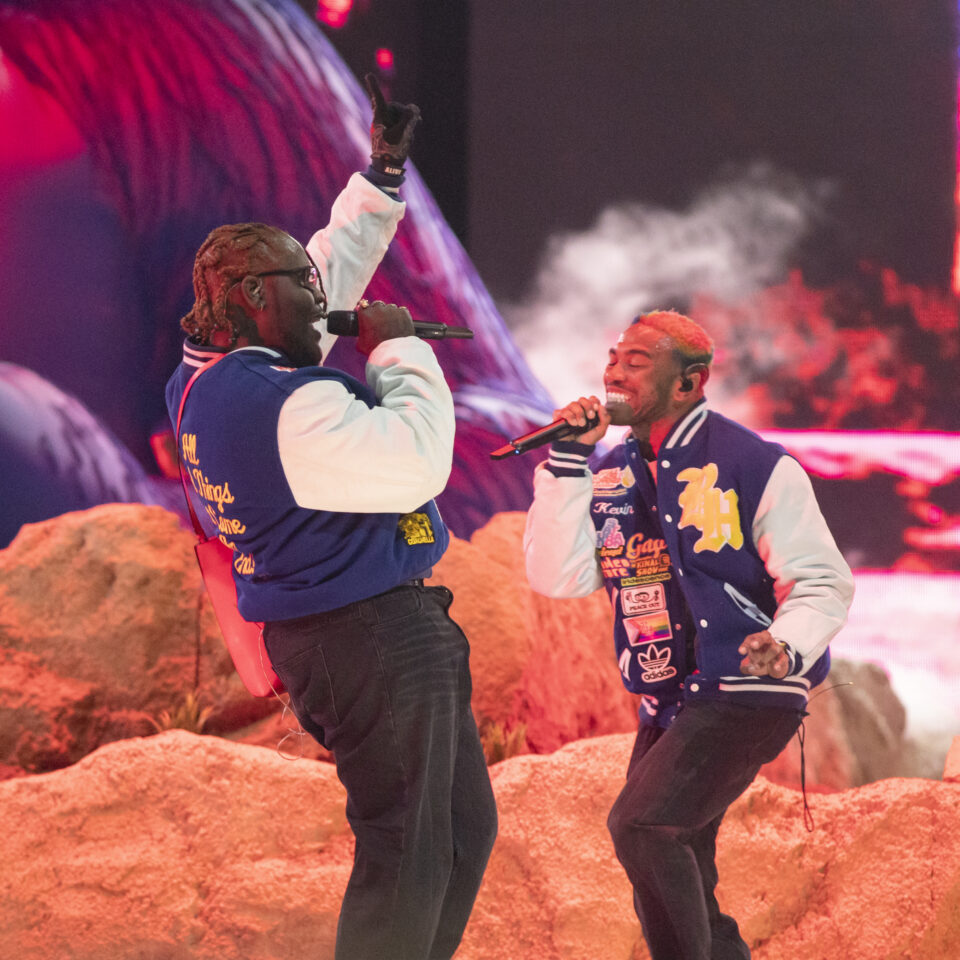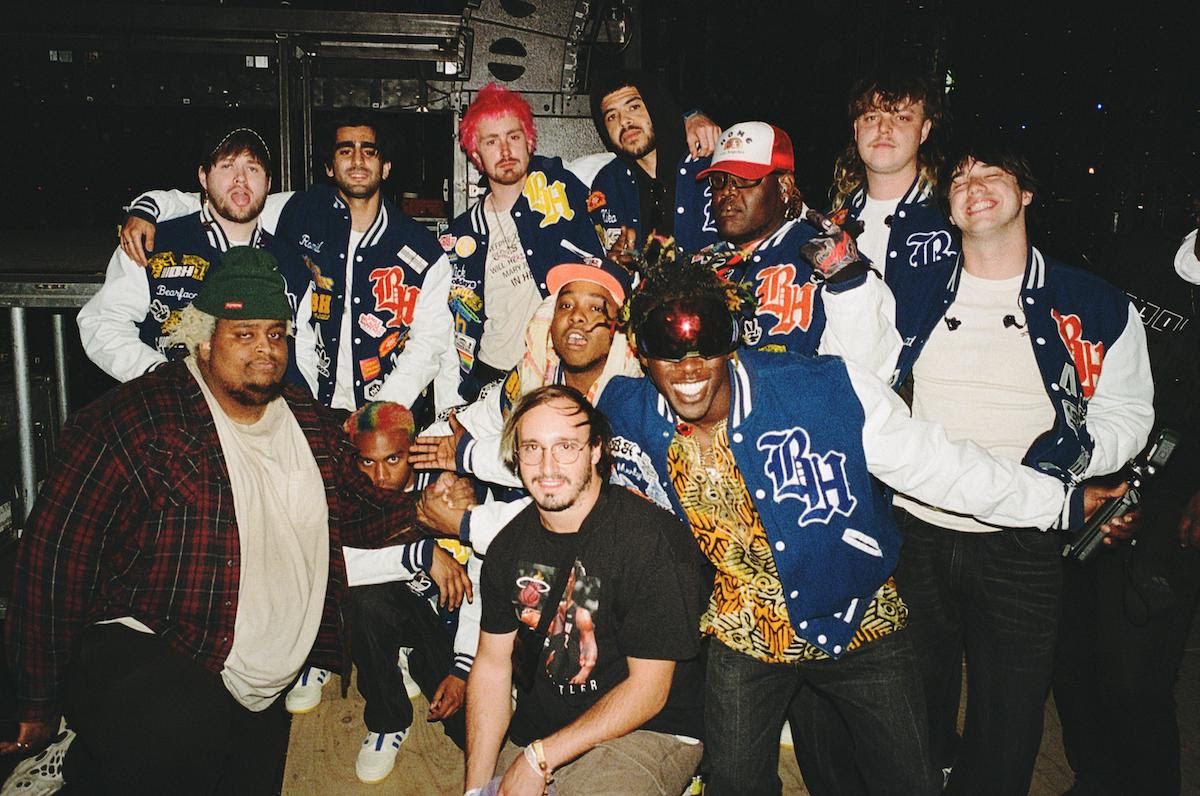The show’s over. One of music’s most interesting and innovative acts has left the building. Brockhampton dropped their final two albums The Family and TM back to back in late November, capping off a surreal rise to the forefront of alternative hip-hop in the collective’s brief seven years in the business.
Like anybody who enjoys a good time, I’m sad to see Brockhampton go. Thankfully, the boys left no shortage of work to revisit—they released eight full-length LPs plus a mixtape, with a surprising lack of filler (their lowest Metacritic score is a 75). The self-described boy band were masters of rich, busy bangers brimming with frenetic enthusiasm—or fury, or any other big emotion—that deftly fused trap, pop, rap, jazz, rock, and a slew of other sonic landscapes into their own reimagining of hip-hop. They’re innovators, and it’s a shame we won’t get to see them continue to do that.
More personally, though? I’ll miss the way the Black, brown, white, queer, straight collective gave women and queer people a break from loving a kind of music that rarely loved them back. As somebody who falls into both of those categories, I’d largely avoided the genre for much of my life (there’s only so much I can enjoy something that’s constantly telling me to suck its dick!). But Brockhampton was my entry point into a corner of R&B and hip-hop that didn’t ask me to tolerate a sour stomach. In lieu of racking up women and money like equally material possessions, Brockhampton opted to explore their psyches as outcasts, weirdos, addicts, mourners, dreamers, and tough guys who didn’t always like their impulse to be tough guys. They weren’t perfect, but they were a sanctuary for many.
In lieu of racking up women and money like equally material possessions, Brockhampton opted to explore their psyches as outcasts, weirdos, addicts, mourners, dreamers, and tough guys who didn’t always like their impulse to be tough guys.
Despite avoiding rap pre-Brockhampton, I also listened to it all the time. You couldn’t help but consume mainstream hip-hop—Lil Wayne, Eminem, T.I., 50 Cent, a certain rapper-turned-full-time-Nazi—via osmosis in the late-’00s and early-’10s when it was on its way to becoming the country’s biggest genre (a feat it officially hit in 2018, per Nielsen). In the suburban corner of Houston where I grew up (and, coincidentally, the city that reared several members of the Texas-centric Brockhampton), hip-hop was everywhere—at school dances, on the radio, at every party or pool hang. Hip-hop, the Harry Potter movies, low-rise jeans—these things were omniscient and impossible to escape.
It’d be much easier to say I always felt dehumanized when, apropos of nothing, I’d hear women called bitches, whores, sluts, hoes, or simply objectified as “pussy.” But mostly I just flinched, squirmed a bit, and resumed listening. And that’s really lame to say! But consider the context. Being sexualized by men was already a deeply familiar feeling. Growing up in the South—suburban Houston, with its megachurches and oil refineries and city-slicker cowboys—meant being surrounded by women who aspired to be wives, young girls on diets, women who slept in makeup in case their house caught fire and their neighbors saw them in the middle of the night (I wish I was joking).

The idea that women matter for sex more than anything else is instilled in girlhood in so many little, constant ways, but especially in the ways that mens’ affirmations told women their jobs were to be pleasing and lovely things. So I’d gotten used to weird feelings in my stomach.
But when I came across Brockhampton, I couldn’t help but notice the heavy absence of that sickly feeling. It was maybe three years ago, around when the band had released Ginger (and five other albums in the three preceding years). The realization wasn’t immediate, but it felt like this: Pretend you’ve eaten 200 grilled cheese sandwiches. Sure, they make you vomit, but they’re also tasty! So you keep eating the sandwiches. Now, pretend the 201st grilled cheese doesn’t make you vomit. Might you finally be able to appreciate the cheesy richness when it’s not filling your stomach with bile? Might you enjoy the crunch of a mayo-soaked crust with a bit more whimsy, because that crust isn’t calling you a two-dollar whore?
No two Brockhampton songs sound alike. Blown-out 808s, boisterous horns, warm R&B guitars, screaming, crooning, swaggering—the boys did it all, and they did it in a way that reflected the current hip-hop moment like funhouse mirrors.
Finally! It was hip-hop I could enjoy, without the wince. A male artist fantasizing about murdering fuckboys is rarely a topic broached in rap, but Matt Champion does precisely that on “JUNKY,” drawling out menacingly: “And yeah, you mad ’cause she ain’t fuck / Mad ’cause she ain’t suck… Where the respect? Is your ass human?… I get my 9-9, I don’t own one / Hit the store to blow your brains off.”
And as a queer person, a break from the genre’s compulsory heterosexuality was a breath of fresh air, too. Kevin Abstract, the frontman and leader, is featured prominently on most songs, and among his most visited subjects are being a gay Black man in a world where female sexual conquests are top-dollar currency. “‘Why you always rap about bein’ gay?’ / ’Cause not enough n****s rap and be gay,” Abstract growls, also on “JUNKY,” a standout on 2017’s Saturation II.
And how fun that it was a completely unstuffy, endlessly exciting band that I got to revel in, like a cooped-up dog shimmying in a big pile of technicolor leaves. No two Brockhampton songs sound alike. Blown-out 808s, boisterous horns, warm R&B guitars, screaming, crooning, swaggering—the boys did it all, and they did it in a way that reflected the current hip-hop moment like funhouse mirrors. “SUGAR” sounds like *NSYNC played around with Auto-Tune and drum pads. “J’OUVERT” is a sinister, slow-rumbling hype track that amps up a Travis Scott–esque darkness. “BOOGIE” feels a little like Graduation soaked in block party sunbeams.
Of course, the band wasn’t perfect, and there are instances where sex is treated as conquest. “Try to tell it to her nicely, but she never wanna listen / Beat the pussy to submission,” Ameer Vann, one of Brockhampton’s founding members, threatens on “STAR.” Notably, Vann was kicked out of the band in 2018 immediately following several sexual assault allegations—an unusually swift form of justice in the music industry, let alone from a band composed entirely of men. “We do not tolerate abuse of any kind,” the band said in a statement following Vann’s departure. “This is not a solution to their suffering, but we hope this is a step in the right direction.”

BROCKHAMPTON / photo by Daniel Cavazos

BROCKHAMPTON / photo by Daniel Cavazos
There’s a line on The Family, in a track aptly titled “BROCKHAMPTON,” in which Abstract attempts to sum up the collective’s aspirational ethos: “I wanted something that felt more real, but still be a popstar / Without making radio songs, and no TikTok bangers.” Abstract’s mission of succeeding on his own terms inherently meant he’d have to buck the conventional hallmarks that otherwise define a successful hip-hop effort. Brockhampton would have to forge a new path; one that innovated sonically and socially, that held up a mirror to the broader hip-hop genre and showed a new way to be.
With its curtain finally drawn, the band’s legacy of decidedly not churning out radio bangers is solidified. Brockhampton challenged when they could’ve conformed; innovated when they could’ve stagnated. They were fully themselves, in all their messy, emotional, introspective, queer glory. And thank goodness for it. FL







